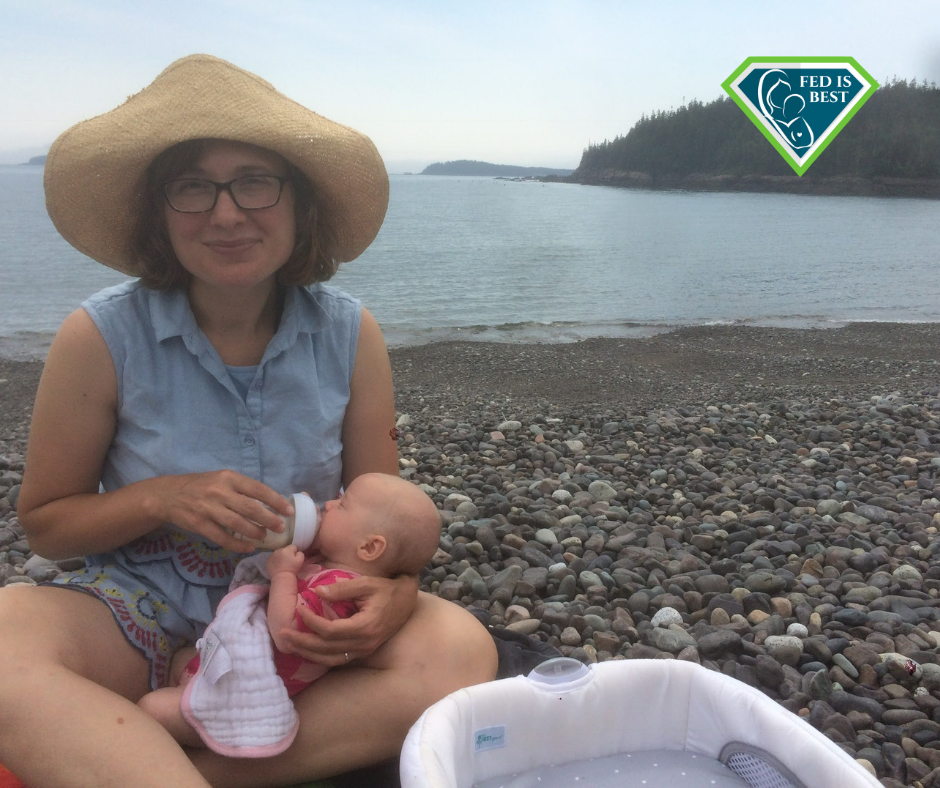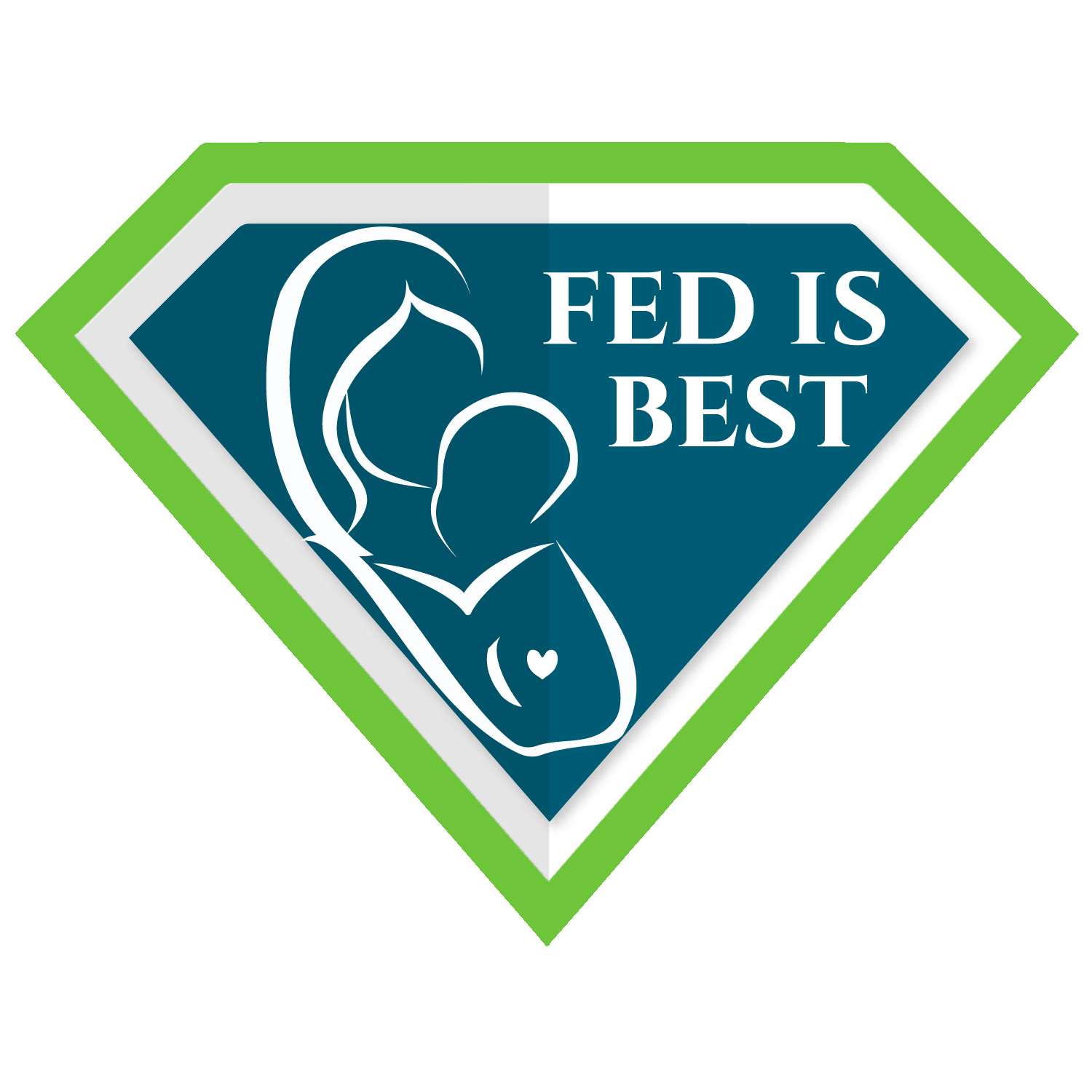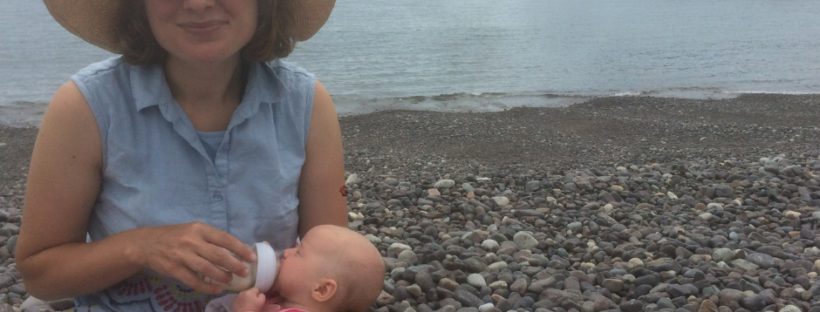by Sarah Cunningham
As a new mom who did not successfully breastfeed, I have so often felt like a lesser mother over the past 9 months, self-conscious whenever someone has asked me, “Are you still breastfeeding?” Or, my favorite follow-up question, “Oh no, what happened!?” I have heard so many references to breastfeeding that at times I have felt as though mothering is breastfeeding– and because I am not doing so, I must certainly be less of a mom.
Like for many others, the “breast is best” mantra-turned-guilt-trip started for me before my daughter was even born. In my last group prenatal meeting, one woman said she planned to feed her baby formula, but felt like the healthcare community would only give her information on breastfeeding.
After a deafening silence, the lactation consultant said, “that’s because we now know that breast milk is better.” And as if that icy tidbit wasn’t enough, she went on to caution, “I will just warn you that this is a very pro-breastfeeding area.” I swallowed hard, internalizing this information as a non-negotiable item, like so many women must do.
When our daughter Summer came, she came with a force. For the first week of her life, we called her “the tomato.” In nearly all of her waking moments her little newborn face was scrunched up and beet red, her lungs working over-time with what we called “the bird call cry.” One of the nurses on the labor and delivery unit asked us “what was wrong with her,” (very reassuring to brand new parents). Of course, now looking back I realize she was just hungry, and that realization breaks my heart. But we didn’t know that and none of the professionals around us told us that.
When we got home from the hospital, disaster struck. Summer just couldn’t seem to get the milk she needed. She would get so worked up and would arch her body into the most difficult contortions. I would arch along with her, trying to aim my nipple into her mouth. Even when we got to her when she was still sleeping, the beginning of breastfeeding could send her into a tizzy. I was naked more than I was clothed, soaked in my own milk as my daughter cried and bit my nipple, bending her body and flailing about.
For the first 72 hours of her life, my husband Nick and I slept for a total of three hours. I was so tired that at one point Nick had to remind me of Summer’s name. I was beginning to be scared by how I felt, feeling I had no control over anything. The baby blues were also setting in and I couldn’t stop the tears. I would sit and cry as my milk leaked and stained my shirts, the couch, the floor, studying breastfeeding diagrams that made it look so easy. All the while Summer would wail uncontrollably in my arms. We called the hospital lactation consultant who gave us advice over the phone. We called to make an appointment with that joyless lactation consultant from the prenatal group, but she was on vacation. We spoke to the midwife, who told us, “not to worry,” and Summer would get it soon. The pediatrician told me to supplement with pumped milk and to come back in three days for Summer to be weighed (not a small chore, living one hour from the hospital).
Not once in all these discussions did anyone mention formula.
On Summer’s one week birthday, I was sitting at the kitchen island, trying to breastfeed as Nick was at the grocery store. My sister-in-law sent me a text wishing Summer a happy one-week birthday. I read the text as if looking at it from a million miles away. Happy? That word was not a part of a lexicon I could remotely empathize with. When Nick came home from the store and found me sobbing in the same place he left me in, he said we needed to make a change. We brought out the breast pump (something I had been nervous about, as the lactation consultant had warned about introducing a bottle “too soon”).
Summer drank much better from a bottle; for the first time since she came into the world, she was showing us that her needs were met. For the first time since she was born, we started to regard her with something other than pure terror.
Pumping and bottle-feeding offered more of a solace, but the schedule was relentless. Pump, feed a bottle, tiny break, pump, feed a bottle…I never felt that I was bonding with my baby because it was too hard to hold her while I was pumping, which felt like much of the day. Moreover, that humorless machine with all its wires was a bear on my nipples. Wearing clothes over my chafed breasts was excruciating, no matter how much nipple cream I applied. It was lonely, too – the pump kept us tethered to home because I was too shy, too overwhelmed to pump in public, as I suspect most women are. I hoped to break the need for the pump, so kept trying to teach Summer how to breastfeed. However, it always provoked a nearly violent reaction in her, which was hard for her (and me and Nick) to recover from.
When Summer was five weeks old, Nick broke his arm and couldn’t hold Summer. As he sat in the emergency room, I sat in bed with my mind racing. He came home, and we jointly agreed – it was time to switch to formula.
Nick and I have strove to create an egalitarian household since the day we met. He was advocating for formula from the minute our breastfeeding journey started to go awry. I surprised myself by declining that route because of the pressure I felt from society, although I knew that it was at the cost of our household’s peace.
After we began to formula feed, that’s when we got our groove as parents. We could equally share the load of caring for Summer – and Summer was well-cared for! No longer needing to pump, we could hold her as much as she needed. Feeling confident that we could meet her needs, our parental love flowed like it hadn’t been able to. Looking back, it’s ridiculous to promote that breastfeeding builds a bond if breastfeeding is not working. If breastfeeding is not working, your bond is threatened – by your infant’s unfulfilled needs, and your feelings of inadequacy.
I look back at that time and feel rage, rage at society for pushing that breast is best – that if you don’t breastfeed, your child will die of SIDS or be sick all the time, or have diabetes later in life, or be obese, or have a lower IQ. These cure-all claims by the breastfeeding-or-bust community are at best flawed and at worst pose a threat to new parents’ mental health, including increasing risks of postpartum depression. Unsurprisingly, recent studies point to correlation, not causation, with breastfed children, and look at what else is going on in a child’s life to help them advance. One such study found that when socioeconomic considerations are accounted for when measuring childhood IQ’s, “the stand-alone effect of breastfeeding seemed to disappear.”
Common sense alone is enough to know that all this pressure would pose a risk for postpartum depression. Unsuccessful breastfeeding is a physical strife that feels emotionally harrowing as you’re unable to fulfill your baby’s needs. Moreover, you then also have to battle society’s unceasing chorus that you’re creating risks for your child if you don’t breastfeed, challenging your very vulnerable identity as a new mother. One UK study found that women who unsuccessfully attempted to breastfeed were “two-and-a-half times more likely to develop postnatal depression, compared to women who had no intention of breastfeeding.” I am aghast that not once did this risk for postpartum depression come up with any healthcare provider as Summer and I (and Nick) struggled through this chapter.
Now I know that being a mother is of course more than producing milk. Being a parent is not a job – it’s a state of being. We don’t need to give ourselves peer reviews and grades. The ultimate goal is to be the love of another little person’s life, and do what needs to be done to feel that way. Hannah Rossin says it best in her 2009 article, “The Case Against Breastfeeding: ”it seems reasonable to put breast-feedings’ health benefits on the plus side of the ledger and other things…on the minus side, and then tally them up and make a decision.” That is exactly what our family did; only I wish we did it on day 2 instead of day 37. It would have saved a lifetime of tears and allowed us to bond with our baby a month earlier than we did.

Provided by Sarah Cunningham, pictured with her daughter

There are many ways you can support the mission of the Fed is Best Foundation. Please consider contributing in the following ways:
- Join the Fed is Best Volunteer group to help us reach Obstetric Health Providers to advocate for counseling of new mothers on the importance of safe infant feeding.
- Make a donation to the Fed is Best Foundation. We are using funds from donations to cover the cost of our website, our social media ads, our printing and mailing costs to reach health providers and hospitals. We do not accept donations from breast- or formula-feeding companies and 100% of your donations go toward these operational costs. All the work of the Foundation is achieved via the pro bono and volunteer work of its supporters.
- Share the stories and the message of the Fed is Best Foundation through word-of-mouth, by posting on your social media page and by sending our resources to expectant moms that you know. Share the Fed is Best campaign letter with everyone you know.
- Write a letter to your health providers and hospitals about the Fed is Best Foundation. Write them about feeding complications your child may have experienced.
- Print out our letter to obstetric providers and mail them to your local obstetricians, midwives, family practitioners who provide obstetric care and hospitals.
- Write your local elected officials about what is happening to newborn babies in hospitals and ask for legal protection of newborn babies from underfeeding and of mother’s rights to honest informed consent on the risks of insufficient feeding of breastfed babies.
- Send us your stories. Share with us your successes, your struggles and every thing in between. Every story saves another child from experiencing the same and teaches another mom how to safely feed her baby. Every voice contributes to change.
- Send us messages of support. We work every single day to make infant feeding safe and supportive of every mother and child. Your messages of support keep us all going.
- Shop and Fed is Best Foundation will earn cash back! We hope to develop our online safe infant feeding classes with these funds.
- If you need support, we have a private support group – Join
We believe all babies deserve to be protected from hunger and thirst every single day of their life and we believe that education on Safe Infant Feeding should be free. If you would like to make a donation to support the Fed is Best Foundation’s mission to teach every parent Safe Infant Feeding, please consider making a one-time or recurring donation to our organization.
Thank you so much from the Founders of the Fed is Best Foundation!
